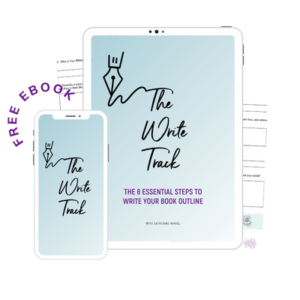Writing is a deeply personal and creative process. But what do you do when the words don’t flow as easily as they used to, or when you’re staring at a blank page without a clue of what to write? That’s where writing inspiration comes in. This guide will offer strategies to get writing inspiration and keep those creative juices flowing.
Understanding Writer’s Block
One of the biggest hurdles in the writing process is writer’s block. It’s that frustrating state where a writer needs help to produce new work or experiences a significant delay in the writing process. It’s often accompanied by a feeling of being stuck. Understanding that this is a common experience shared by many writers can be the first step toward overcoming it. Remember, even the most successful writers have faced this challenge at some point in their careers.
The causes of writer’s block can be various, ranging from self-doubt and fear of criticism to perfectionism and high expectations. Sometimes, it’s simply the need for fresh ideas. The key to finding writing inspiration when facing writer’s block is to not pressure yourself. Instead, allow yourself to explore new directions and possibilities in your writing.
In an article from the Non-Fiction Authors Association, I was quoted [as it pertains to writers’ block] saying, ‘Write every single day. Creating a daily habit of writing is the best way to help foster your creativity, avoid writer’s block, and help develop your writing skills. It’s OK to be vulnerable. Your first draft won’t be your final manuscript, so get raw, real, and authentic; the editing process can happen later.‘
Seeking Inspiration in Everyday Life
One of the best sources for writing inspiration is your own life. Experiences, observations, and interactions can be fodder for your next story. Draw from your own experiences and turn them into compelling narratives. The trials and triumphs you’ve faced, the exciting people you’ve met, and even the mundane details of daily life can become the foundation of your writing.
People-watching is another interesting activity that can get the creative juices flowing (one of my favourite pastimes!). Spend time observing the people around you in a local coffee shop or a busy street. Their mannerisms, conversations, and interactions can be a great source of inspiration. Every person has a story to tell, and as a writer, you can say it uniquely.
Using Writing Prompts
Writing prompts can be an excellent tool for kickstarting your writing process. They can be a focal point, guiding your writing toward a specific theme or idea. Numerous online resources provide writing prompts for every genre, from historical fiction and fairy tales to murder mysteries.
Writing prompts can also be an effective tool in overcoming writer’s block. They offer a starting point, helping to shift your mind from the stress of coming up with an idea to developing and exploring one.
Seeking Inspiration from Other Writers
Reading works by your favourite writers can inspire you to start writing yourself. The writing style, narrative techniques, and the way they weave words into captivating stories can serve as a learning experience. Their stories can spark ideas for your own stories, providing a springboard from which creativity can leap.
Biographies and interviews of successful writers can also be insightful to aspiring writers. Understanding their writing process, how they deal with writer’s block, and where they find their own writing inspiration can provide helpful pointers to better writers.
Leveraging the Digital Age
In the digital age, numerous online resources help writers get inspired to write. There are forums for writers to share their work, platforms that offer writing prompts, and blogs dedicated to writing tips and techniques.
The key to finding writing inspiration is staying open to ideas, wherever they come from. Whether it’s from a conversation overheard at the local coffee shop, a news story that caught your attention, or a writing prompt that sparked your interest, you find the best writing inspiration can come from the most unexpected places. The important thing is to keep writing. You’re moving one step closer to your writing goals with every word, sentence, and paragraph.
Harnessing the Power of Observation and Imagination
Writing inspiration is not only about waiting for a creative idea. Sometimes, you must actively have a creative idea and seek it out. And the world around you is full of potential stories waiting to be told.
“Start writing just by observing your surroundings in detail. The older man feeding the pigeons in the park, the mother consoling her crying child, and the couple arguing in the supermarket aisle can inspire an intriguing story or character. You can give them a history, a present, and a future. This is an area fictional writers can take significant advantage of; you can breathe life into characters and give them interesting stories.
Now, apply your imagination to these observations. For example, is the older person feeding the pigeons a retired spy, recalling his past missions? Is the crying child upset because they have superhuman senses overwhelming them? Is the couple arguing over a secret they’ve just discovered? You’ll find that, in the same way, combining real-life observation with a dose of fantasy can result in some truly inspired writing.
Drawing Inspiration from Your Own Life
No one else in the world has lived your life, which makes putting words to your experiences unique and valuable. Your life can serve as a treasure trove of inspiration for your writing. After all, they say truth can be stranger than fiction.
This doesn’t mean that you have to write an autobiography. You can extract bits and pieces from your own life – emotions you’ve felt, experiences you’ve had, people you’ve known – and weave them into your stories. You can write about a place you’ve been, a situation you’ve faced, or someone you’ve learned and then tweak these elements to fit your story well.
Revisiting Your Old Writing
Your own writing can be an excellent source of inspiration. Revisiting your old work, whether your published pieces or those sitting forgotten in a drawer, to find writing inspiration can reignite the creative spark. You may find threads of ideas you had forgotten about or discover that your writing skills have evolved, offering a fresh perspective on an old story.
One of my favourite resources is old journals. It could be a note I took from a speaker I was listening to or a quote I wrote down from a book I was reading — old notebooks/journals have been GOLD!
Embracing Different Art Forms
Inspiration doesn’t only come from writing or other written works. Diverse art forms such as music, painting, photography, films, and theatre can stir up emotions and ideas that can be translated into your writing. A haunting melody, a powerful photograph, or a compelling movie can inspire a range of stories or add depth to your characters.
For example, you might attend a local theatre production and be so moved by the performance that you feel inspired to write a short story around a similar theme. Or, you might watch a movie and connect with one of the characters, prompting you to create a character with similar traits or backstory in your writing.
Breaking Out of Your Comfort Zone
Sometimes, challenging yourself is the best way to stimulate inspiration for a new novel. If you’re a novelist, try writing a poem. If you usually write historical fiction, experiment with science fiction. Breaking out of your comfort zone can help you think in new ways, ignite fresh ideas, and invigorate your writing process.
Keep in mind that only some of your writing needs to be for publication. The purpose of these exercises is to keep the creative juices flowing and to explore new avenues for your writing.
It’s important to remember that every writer is unique. What works for one might not work for another. The trick is to keep experimenting until you find what works best for you. It’s all part of the exciting journey of being a writer.
Joining a Writing Group
Joining a writing group can be a great way to find writing inspiration. These groups provide a platform to share your work, get constructive feedback, learn from others, and find inspiration in fellow writers’ stories.
A local writing group can also be a source of networking and camaraderie. Interaction with other writers, sharing ideas, critique, and suggestions can be very stimulating for your writing. Discussing your work with others can spark new ideas, refine existing ones, and reignite your passion for writing.
Online writing groups and forums can also be valuable, especially if you don’t have a local group or prefer to share your work digitally. Online platforms can offer an even larger community of writers worldwide, contributing to a rich exchange of ideas and experiences.
Drawing Inspiration from Prompts and Challenges
Writing prompts and challenges are excellent tools for sparking creativity and overcoming writer’s block. They can be a starting point for a new story or help you explore new writing styles and genres.
Writing prompts can range from a single word or phrase to a picture or a scenario. The idea is to write something based on the prompt without worrying too much about it being perfect or coherent. The aim is to get the creative juices flowing, and who knows, a prompt might inspire creative ideas for your blog post, next novel, or short story.
Similarly, writing challenges, such as writing the first draft of a story using only dialogue or writing a story with a specific word count, can stretch your writing skills and stimulate your creativity.
Tuning into Your Curiosity
Curiosity is a powerful source of inspiration. If you find something that piques your interest, explore it. It could be anything from a news story to a historical event, a scientific discovery, or a local legend. Researching these subjects can open up new avenues for your stories.
Being curious also means asking interesting questions about the world around you. What if scenarios are particularly effective. For example, what if the world was run by children? What if animals could talk? What if you woke up one day and everyone else had disappeared?
These sorts of questions can lead to some fascinating and unique story ideas. These ideas can be a focal point for your writing, guiding you through crafting your story together.
Balancing Writing with Rest
Rest is as important to the writing process as active work. Regular breaks allow your mind to recharge and your subconscious to mull over ideas. It’s often during these rest periods that ideas tend fresh start to percolate, and inspiration strikes. So, balance your writing routine with enough downtime, and don’t feel guilty about stepping away from your writing for a little while.
Remember, finding inspiration for your writing is a very personal journey. What inspires one writer might not motivate another. But by staying open, curious, and active in your pursuit of ideas, you’ll find that inspiration can strike in the most unexpected places.
So, explore, and let the world inspire you to create your best first writing experience yet.
The Power of “What If” Questions
As an aspiring writer, one of your most potent tools is the power of “what if” questions. The beauty of these questions lies in their eternal nature. You can spin any situation, character, or idea into a unique story by asking, “What if?”
This approach can trigger a plethora of fresh and interesting ideas and perspectives. For instance, what if an everyday object had magical properties? What if a particular historical event had a different outcome? These questions stimulate your imagination and can often result in exciting stories.
Learning from Successful Writers
Successful writers have a wealth of knowledge and experience to offer. Reading interviews, watching their talks, or reading their blogs can provide insights into their writing process, their challenges, and how they find inspiration.
You can learn how they tackle writer’s block, develop characters, or plan their plots. Drawing from their experiences can help you enhance your writing style and find new ways to get inspired.
Immersing Yourself in Various Art Forms
Art, in its many forms, can be a great source of inspiration. Literature, paintings, music, films, and theatre can evoke emotions, stimulate thoughts, and spur creativity. Try immersing yourself in a variety of art forms. For instance, you might watch movies or plays, visit art galleries, attend concerts, or read different types of literature.
Each experience can open your mind to new ideas, themes, characters, and narratives. A particular scene in a movie, a piece of dialogue in a play, or the emotion conveyed in a song can trigger an idea for your next story.
By incorporating these tips into your writing routine, you’ll find that inspiration is not as elusive as it seems. Remember, writing is a journey of self-discovery and expression. Keep exploring, stay curious, get inspired, and let the world around you fuel your creativity.
Exploring New Locations
Changing your physical environment can dramatically impact your perspective and ideas. Whether it’s moving to a local coffee shop, a library, or even a new city or country, new locations can inspire new ideas. These new environments can spark creativity by exposing you to different people, cultures, and experiences.
The Importance of Rest and Relaxation
In pursuing inspiration, remember the importance of rest and relaxation. Creative burnout is real; pushing yourself too hard can stifle creativity and leave you feeling stuck. Taking breaks, engaging in activities you enjoy, and ensuring you look after your physical and mental health is essential. Inspiration often strikes when our minds are relaxed and free from stress.
Drawing from Personal Experience
Your own life is a gold mine of inspiration. Personal experiences, emotions, and observations can all serve as a foundation for your writing. Our experiences shape us and influence our perspective of the world. Drawing from your own life can bring authenticity and depth to your writing.
While it can be intimidating to incorporate personal experiences and feelings into your writing, doing so can make your story resonate more deeply with readers. You don’t need to retell your life story precisely as it happened — you can borrow elements, mix them with your imagination, and create something entirely unique.
Using Your Dreams
Have you ever awakened from a strange or vivid dream and thought, “That would make a great story”? Dreams can provide rich material for your writing. Keeping a dream journal beside your bed and jotting down as much as you remember upon waking can provide you with a unique source of inspiration.
Engage with Other Creative Fields
Involving yourself in other creative activities can also inspire your writing. Painting, playing a musical instrument, acting, or even cooking can open your mind to different ways of thinking and help you approach your writing from a fresh perspective.
Exploring Historical Fiction for Inspiration
Diving into historical fiction can offer another wellspring of writing inspiration. Immersing yourself in a different period allows you to explore various social customs, speech styles, and fascinating historical events. This might spark an idea for a short story set in Victorian England or a murder mystery unfolding amid the French Revolution.
Using Fairy Tales and Mythology
Don’t underestimate the power of fairy tales, legends, and mythology for writing inspiration. These stories have survived centuries, and for a good reason: they address universal themes, fears, and desires. You can reinterpret these stories or use them as a starting point for your tales.
Reading News Stories
News stories are also a valuable source of writing inspiration. From local news to global issues, stories in the news can provide ideas for characters, plots, and themes to write. You might be inspired or even find inspiration in the smaller, human-interest stories often in local newspapers.
The Role of Solitude in Writing
Great writers often emphasize the importance of solitude in their process. Silence and isolation can foster deep thought and allow your creativity to flow unrestricted. Finding a quiet place to think, whether a local coffee shop or a park, can be an excellent source of writing inspiration.
Role of Books and Reading
Books can offer a wealth of inspiration. They expose you to different writing styles and voices and present a variety of characters, plots, and settings that can inspire your own stories. So keep reading – and keep finding new worlds that inspire you.
Stay Healthy
A healthy mind resides in a healthy body. Regular exercise, a balanced diet, and sufficient rest can significantly influence your creative output. When physically fit, your mind is sharper and more receptive to new ideas.
Practice Gratitude
Practicing gratitude can open your mind to positive thinking and help you find inspiration. Try keeping a gratitude journal where you jot down things you are thankful for. Recognizing the positive aspects of life can help spark optimistic ideas, creative people, and insightful.t twists. You might also find inspiration in your experiences, emotions, and dreams.
Frequently Asked Questions on How to Get Writing Inspiration
How can I find inspiration when I’m stuck?
Feeling stuck is a common experience for many writers. In such cases, you might find inspiration in different ways. Here are some suggestions:
- Engage in people watching: Observing people and their interactions can be a great source of inspiration. You can do this in a local coffee shop, a park, or a shopping mall.
- Read widely: Dive into books from different genres, authors, and cultures. They can offer new perspectives and ideas.
- Draw from personal experience: Your life is rich in unique and authentic stories. Reflect on your experiences and see what ideas they inspire.
How can I stay inspired to write consistently?
Staying inspired consistently can be challenging. Here are some tips:
- Maintain a regular writing routine: This can help train your mind to be creative at specific times.
- Join a writing group: Sharing your work and receiving feedback can be motivating. It also gives you a sense of community and support.
- Take breaks: Overworking can lead to burnout. Taking breaks, relaxing, and recharging your creative energy are crucial.
Are there any practical exercises for finding writing inspiration?
Yes, numerous exercises can help you find writing inspiration:
- Writing prompts can kickstart your creativity and get you into the writing process.
- Free writing: This exercise involves writing non-stop for a set period. Don’t worry about grammar, punctuation, or making sense. The goal is to let your thoughts flow freely.
- Mind mapping: Start with a central idea and draw branches with related thoughts or subtopics. This visual representation can help you explore different aspects of a theme.
Does writer’s block mean I’m not a good writer?
No, experiencing writer’s block doesn’t reflect your talent or potential as a writer. Even the most successful writers face periods of creative stagnation. It’s a normal part of the writing process. The key is not to get discouraged. Instead, try various techniques to overcome it and reignite your creativity.
How can I use real-life experiences for writing inspiration without infringing on privacy?
When drawing from real-life experiences, it’s crucial to respect privacy. To protect privacy, you can change identifying details, merge characters, or adjust events. Remember, your goal is not to replicate reality but to use it as a starting point for your creative exploration.
Use your Voice, Make an Impact.
Catherine x

Email: catherine@catherinenikkel.com
Resources
What type of Content Creator are you? Take the Quiz! – 4 different types of creators, which one are you?
Need help telling your story in your own voice? Let’s make it happen. Schedule a consultation with me here






